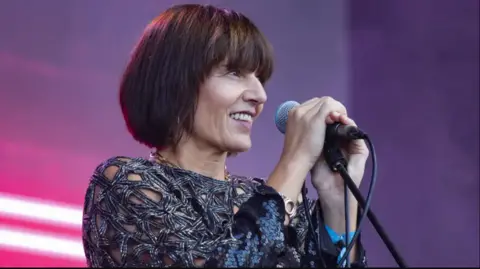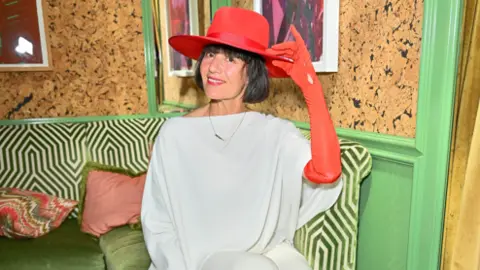Perimenopause awareness call after singer's death
 Getty Images
Getty ImagesThe family of Crazy P frontwoman Danielle Moore have called for more awareness around the impact of perimenopause on mental health after a coroner confirmed she took her own life.
Moore died in Birmingham on 30 August at the age of 52.
Following her inquest on Thursday, her husband James Ensell said although a conclusion of suicide was expected, he and her family were "still reeling".
Describing his wife as "unique and remarkable", Mr Ensell said he wanted to highlight "the prevalence of neurological and psychiatric symptoms during the perimenopause".
Moore joined Crazy P in 2002 going on to release seven studio albums and perform at numerous festivals and gigs.
The band confirmed her death in a statement on Instagram, prompting tributes and condolences from those in the music industry.
A record of the inquest at Birmingham and Solihull Coroner's Court said Moore had tried to end her life in 2010 and was treated briefly for anxiety disorder in 2017.
More recently, she had suffered from low mood and reported dissociation against a background of being impacted by exhaustion from working as a musician and symptoms of the perimenopause, the transitional period before a woman reaches menopause.
Moore was prescribed HRT but the coroner said she had gone on to self-diagnose and contact a private therapist with a view to future holistic therapy, but said: "Otherwise, her actions were unexpected."
 Getty Images
Getty ImagesFollowing the hearing, Mr Ensell released a statement on behalf of her family saying while they will "never fully understand why Danielle took her life, we know that how she died bears no relation to who she was in life".
The singer had previously overcome two periods of significant mental ill-health and "with support and treatment, Danielle came through what had seemed, at those times, to be intolerable and wanted to keep on living", he added.
Mr Ensall said he wanted to use her death to highlight the mental impact of perimenopause, something "well-known within the scientific community, but little talked about outside it".
"They say that to be forewarned is to be forearmed, so if any good can come from Danielle's death, perhaps it will be increased awareness and understanding of the impact that the perimenopause can have on women's mental health," he said.
He thanked everyone who had seen his wife perform and doing what she loved and described her as someone who deeply cared for others and social injustice.
She was "instinctively compassionate and loyal, nurturing the truest of connections with the people in her life," he said.
Although the family would never get over her loss, he added: "We try to remind ourselves that our love came first.
"We grieve because we love. And we couldn't have loved her more."
If you have been affected by this story or would like support then you can find organisations which offer help and information at the BBC Action Line.
Follow BBC Birmingham on BBC Sounds, Facebook, X and Instagram.
